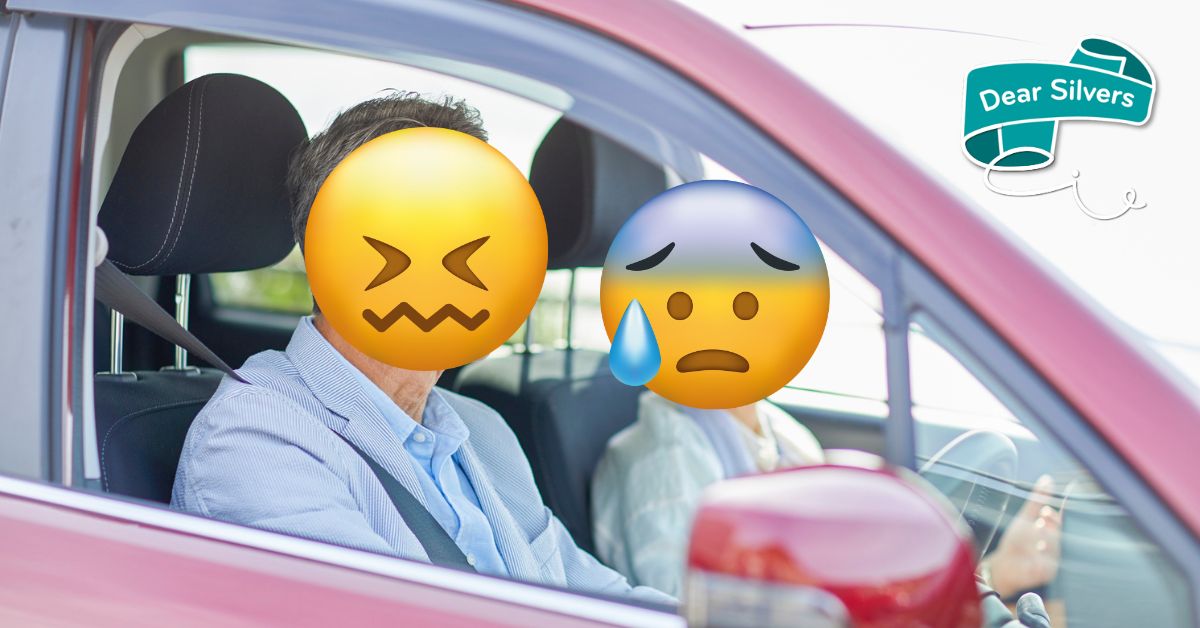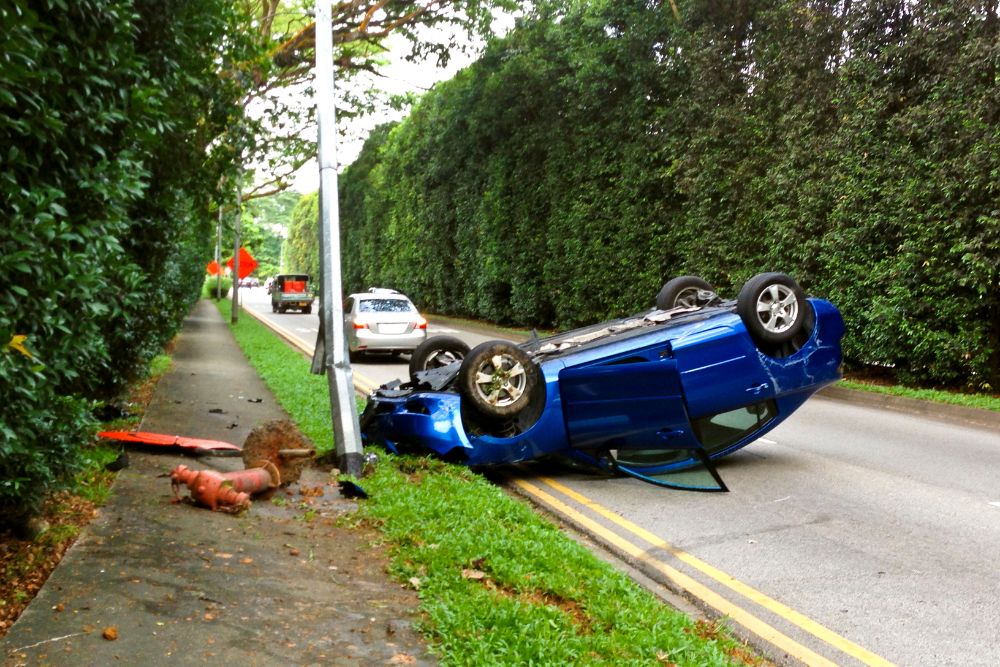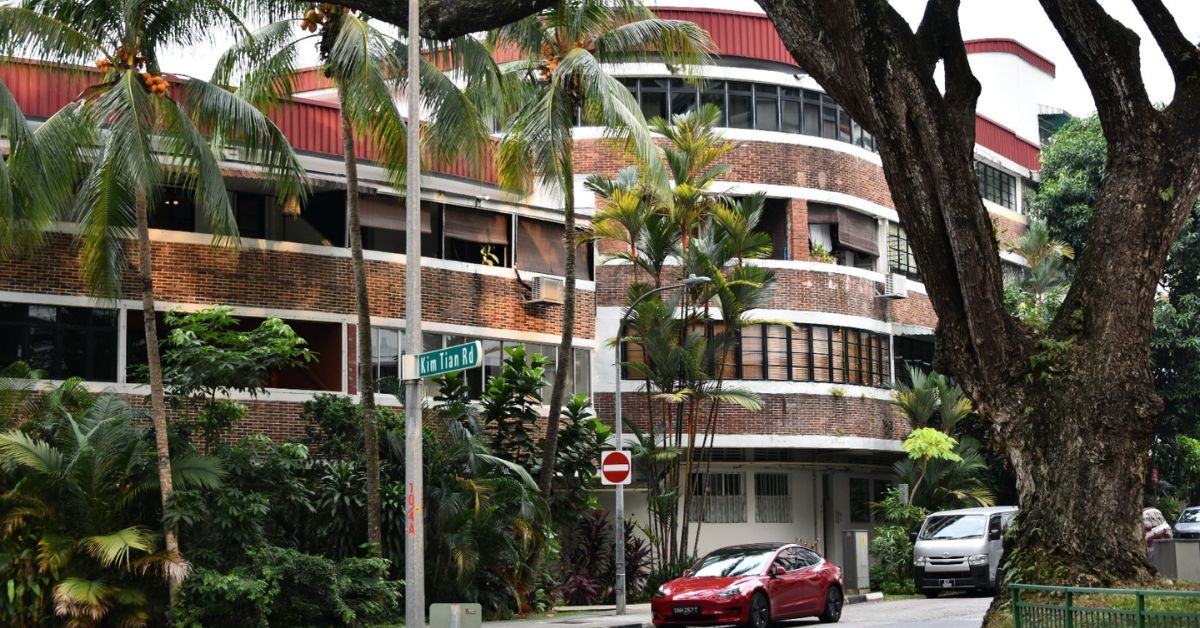
Dear silvers,
Nothing makes my father (and his loyal son) more unabashedly ageist than when we’re stuck in traffic behind an erratic or slow-driving senior driver.
Like the biblical descriptions of Hell, our car explodes with much wailing and gnashing of teeth. In mere moments, we commit several cardinal sins – restlessness, as we desperately search for an opening to escape to another lane; wrath, when we inevitably fail; and murder of an innocent victim, most typically the steering wheel by strangulation.
After what feels like an eternity of torment (usually around five to 10 seconds), absolution arrives, and we ascend into a new paradise of stress-free driving.
That’s usually when my 63-year-old father would turn to me and say — without the slightest hint of irony, and often with a good degree more colour — “Old people shouldn’t be allowed to drive”, perhaps forgetting that in two years, just before his 65th birthday, he will be legally required to perform a medical examination in order to keep driving.
He’d have to submit to a battery of physical and mental impairment checks with a Singapore-registered doctor, who will then decide whether this senior should be allowed to drive – at least, for the next three years, after which they would have to do it all over again.
Advertisement
No age limit for Singapore motorists

In recent years, however, the issue of whether the elderly in Singapore should stop driving after a certain age has become especially prickly, thanks to a spate of accidents involving senior motorists.
In one particularly high-profile example, the 88-year-old founder of the popular Ng Ah Sio Bak Kut Teh restaurant, Ng Siak Hai, crashed after losing control of a car he was driving, leading to the death of a friend and injuries to another.
He was fined $14,000 after pleading guilty to causing death and grievous hurt while driving without due care and attention and barred from holding or obtaining all classes of driving licences for eight years.
In a separate incident last year, a 77-year-old driver was arrested for careless driving, causing grievous hurt after being involved in an accident with an 83-year-old cyclist, who later died.
Setting aside these attention-grabbing incidents, the number of accidents caused by senior motorists hasn’t actually increased sharply in recent years.
According to the national broadsheet, there were 11 fatal accidents involving drivers aged 65 and above (including motorcyclists and heavy vehicle drivers) in the first half of 2024, compared to eight in the same period in 2023.
At the same time, accidents resulting in injuries among senior drivers rose from 606 to 639 in the first half of both years respectively.
However, both increases were relatively small, and as the newspaper noted, could be attributed to Singapore’s ageing population.
Nevertheless, these incidents once again led to online rumblings that Singapore should conduct stricter driving tests for senior motorists — or even instate a statutory driving age limit. Currently, there is only an age limit of 75 for vocational drivers like those in taxis, private-hire vehicles and heavy vehicles.
The senior driving dilemma
As you’d expect, senior drivers are almost universally rankled by the suggestion. I conducted a straw poll among older relatives and the silver parents of friends, and none were supportive of a hard age limit for driving (yes, even my father).
Instead, they preferred stricter testing, figuring that it would better assess drivers’ capabilities outside of their chronological age.
David Chee, a 67-year-old retiree, has already done his medical test once at 65. However, he believes that a more stringent mobility and agility test could help determine if drivers are “able to respond nimbly” on the road.
Fellow retiree Lisa Ong, 64, agrees, adding that the battery of tests “should become more stringent as age climbs”, though like David, she is against a hard limit.
In fact, senior drivers generally believed that they are often safer drivers than almost all the other motorists on the road. And, largely, they’d be right – in both Singapore and a larger dataset like the United States, it is the younger drivers who are at the highest risk for car crashes, mainly due to their lack of driving experience and propensity for aggressive or reckless driving, especially with friends in the car.
However, that doesn’t change the fact that due to their relative physical frailty, senior motorists are far more likely to die in an accident compared to younger drivers in the United States, with a 2.5-fold increase in risk for those aged 75 to 79, and five times the risk at age 80 and up.
Dear silvers: When is it time to stop driving?
Seniors are a heterogeneous bunch. Nevertheless, there are risk factors which will gradually increase with age, including fading vision, slower reaction time, impaired coordination or fatigue.
Those with progressive impairments like Parkinson’s disease, or who are experiencing side effects from their medication, are also at a greater risk of a motor accident.
So without a hard age limit for Singapore motorists, when exactly is the right time to give up driving? Senior drivers say that it depends on the individual.

David, having witnessed an acquaintance give up his car in light of deteriorating eyesight and “a lack of confidence to handle the car”, avers that he too will ease off the pedal once he is “physically unsuitable and unsafe on the road, becoming a liability”.
My father is especially adamant that the decision should lie with the seniors themselves. After all, he’s seen one of his older brothers forcibly grounded by a well-meaning son after a minor accident.
As a younger driver with around ten years on the road, I find myself leaning towards the son’s point of view. Due to a phenomenon known as optimism bias, the vast majority of drivers (myself included) tend to believe we’re above average in skill, despite the fact that most accidents are caused by simple human error.
It’s hard to tell when it’s time to stop driving. In my straw poll, most people knew seniors who gave up the wheel only after scares like my uncle’s.

Now, this doesn’t go just for senior drivers – everyone should know when they’re too tired to drive, or that driving while texting is a recipe for disaster. The constant barrage of prominent incidents – like the intoxicated driver who left an auxiliary officer in a vegetative state after crashing into him at Tuas Checkpoint, or the fiery Tanjong Pagar crash which saw the death of five men – shows that the driving culture in Singapore leaves much to be desired.
Maybe the government’s push for a car-lite Singapore wouldn’t be so bad after all. At the very least, it’d certainly help with my blood pressure.






